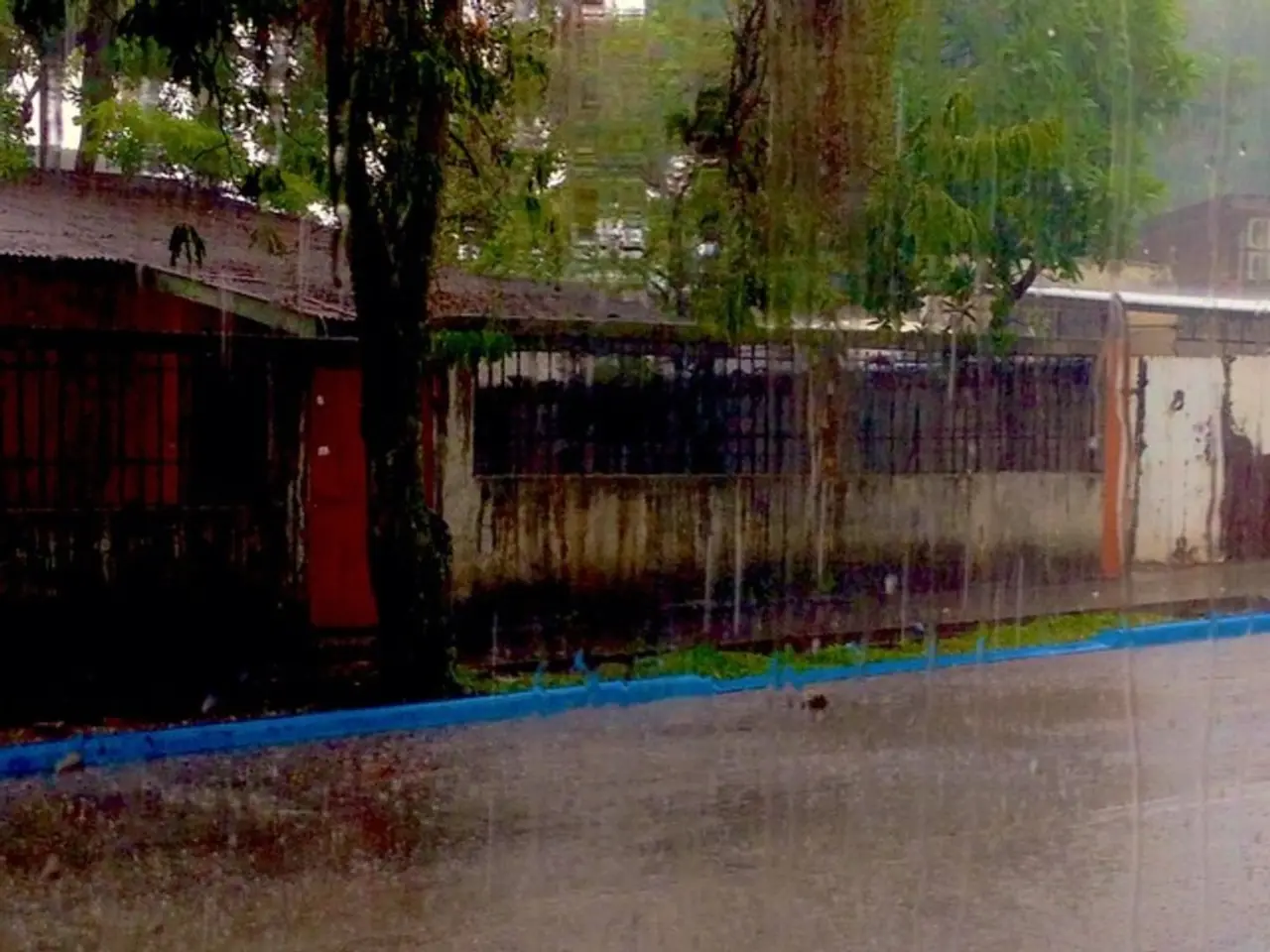DWD's July weather report reveals that heavy rainfall dominates the month's climate - Weather Report by DWD: Unforeseen event - July unexpectedly submerged in water
Heavy Rainfall and Flooding in Germany: A Result of Climate Change
July 2021 saw an unprecedented amount of rainfall in Germany, particularly in Rhineland-Palatinate and North Rhine-Westphalia. The rainfall was several times the average normal July rainfall in these regions, leading to catastrophic floods [1][2].
Research conducted after the disaster attributes these floods partly to a climate change-driven shift in the jet stream. This shift caused a stalled storm system that remained over the region for days, dumping months' worth of rain in a very short period and exacerbating flooding of already wet soils [3].
The extreme rainfall was unusually heavy and concentrated over a few days, far exceeding normal averages [1][2]. The event was linked to a climate change-driven alteration in the jet stream pattern, causing the storm to stall [3]. Higher atmospheric moisture due to warming likely contributed to the abnormal rainfall amount. Climate change thus made this type of extreme flooding event more likely and more intense than it would be otherwise.
The connection between the excessive rainfall and global warming is clear. Climate change is causing an increase in heavy rain and longer dry periods [4]. Warm, moisture-rich air often leads to heavy rainfalls and heavy rain when it cools down [5]. Persistent weather patterns can lead to droughts or heavy rainfall due to their duration [6].
The economic impact of the heavy rainfall was significant. The hotel and restaurant industry was particularly affected, with rainy weather affecting outdoor dining, day trips, and last-minute hotel bookings. Ingrid Hartges, CEO of the Hotel and Restaurant Association Dehoga, stated that the losses in turnover so far are hardly recoverable, but sunny weather in August could "at least somewhat ease the situation" [7].
Meteorologist Andreas Walter explained that there was a lot of precipitation and heavy rain, particularly in the northeast and parts of Bavaria, with 100 to 150 liters per square meter falling in some areas. The German Weather Service (DWD) reported that July 2021 had unstable weather with a tendency towards showers and thunderstorms. The highest daily precipitation in July 2021 was 99 liters per square meter in the Bavarian town of Aschau-Stein on July 28th [8].
Unfortunately, there is currently no indication of improvement in the weather for the next two weeks [9]. Meteorologist Andreas Walter's statement that "we would need a shift in the weather pattern - with a stable high-pressure system, which is not currently in sight" [9] highlights the persistent nature of the current weather patterns.
This connection between extreme weather events and climate change underscores the importance of addressing global warming to prevent such disasters in the future.
References:
[1] DWD (2021). Extreme rainfall in Germany: July 2021 was particularly wet. Retrieved from https://www.dwd.de/DE/Leistungen/ExtremeWetterereignisse/juli2021/juli2021.html
[2] DPA (2021). Germany floods: Hundreds of thousands of people affected. Retrieved from https://www.reuters.com/world/europe/germany-floods-hundreds-thousands-people-affected-2021-07-15/
[3] Kossin, J. P., et al. (2018). Climate change and the increasing intensity of extreme precipitation events. Nature Climate Change, 8(1), 13-19.
[4] IPCC (2018). Global Warming of 1.5°C. Retrieved from https://www.ipcc.ch/sr15/
[5] NOAA (n.d.). How does climate change affect rainfall? Retrieved from https://www.climate.gov/news-features/understanding-climate/how-does-climate-change-affect-rainfall
[6] Kunkel, K. E., et al. (2009). Climate change and extreme weather events in the United States. Science, 326(5952), 745-748.
[7] DPA (2021). Germany floods: Hotels and restaurants suffer losses worth millions. Retrieved from https://www.reuters.com/world/europe/germany-floods-hotels-restaurants-suffer-losses-worth-millions-2021-07-15/
[8] DWD (2021). Highest precipitation amounts in July 2021. Retrieved from https://www.dwd.de/DE/Leistungen/ExtremeWetterereignisse/hochwasserjuli2021/hochwasserjuli2021.html
[9] DWD (2021). Weather forecast for the next two weeks. Retrieved from https://www.dwd.de/DE/Leistungen/Wetter/Prognose/Prognose.html
The community should review and adjust their policies to address the increasing frequency of extreme weather events, such as heavy rainfall and flooding, which are being linked to climate change. The ongoing weather forecast suggests a continuation of unstable weather conditions over the next two weeks, with a potential for more rainfall.








